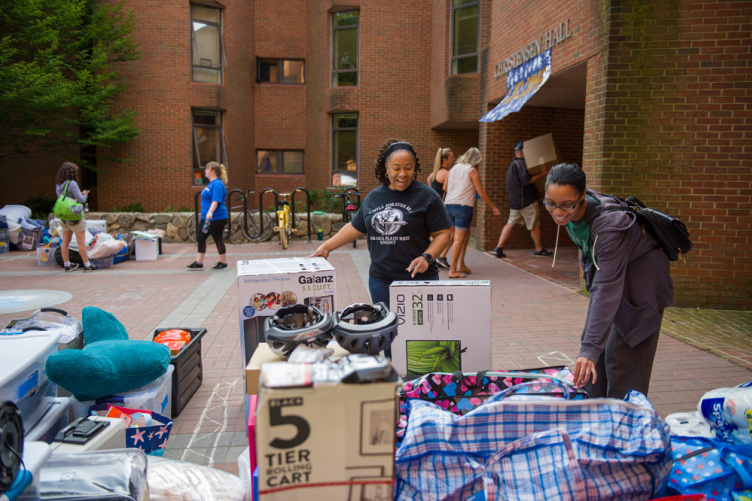
UNH students move onto campus during a recent move-in day.
Not long ago, David May visited the Gables apartments during move-out and was shocked. “We provided extra-large dumpsters, and they were overflowing with stuff,” says May, associate vice president for business affairs. “We knew we needed to do something.”
That something has been a community effort in the residence halls with UNH administration to reduce waste. Through infrastructure changes and broad outreach efforts, UNH residence halls have reduced the amount of waste they produce by nearly 30 percent in the past two years, a staggeringly effective effort that UNH hopes to replicate across campus.
“Nowhere else on campus are we seeing this level of waste reduction,” says Jennifer Andrews, project director at UNH’s Sustainability Institute. “The process of achieving STARS Platinum showed us the areas in which we most need to improve, and waste reduction is one of them,” Andrews adds. STARS Platinum is the highest available sustainability rating available from the AASHE. UNH earned Platinum status in September 2017, becoming one of only three universities in the U.S. to have achieve it.
“The great success of this residence hall effort shows us that UNH staff and students have the leadership, creativity and commitment that we will need to be successful, long-term, in meeting this key sustainability challenge,” Andrews says.
A secret to the success? “We removed the large dumpsters from our move-out operations and encouraged students to take their items home,” says May. This was no small feat. May and other UNH administrators were concerned that smaller bins would mean garbage overflow and frustration. They thoughtfully and intentionally crafted a plan to reduce this change. Simultaneously, UNH Housing began working more closely with Trash 2 Treasure to ensure gently worn items were collected and stored for their fall yard sale rather than being piled in the dumpsters and sent to the landfill.
While waste can often be most visible during move-in and move-out, UNH Housing and Residential Life have done much to ensure that waste and recycling are a consistent, year-long theme. Hall directors and students have been exploring different ways to integrate waste reduction into programming.
“Earlier this semester we hosted a Recycling Challenge in our building,” says Jessie Montville, director of Peterson Hall. “Students placed boxes in the main lobby of the building pertaining to each of the resident assistants (RA) in the building. For one week, residents were encouraged to bring their recycling to the main lobby and place it in whichever RA box they would like with the knowledge that at the end of the week, the RA with the most recyclables in their box would have to complete a self-chosen challenge; i.e., dye their hair, eat a vegetarian diet for a week, etc. It was very successful, and residents had a lot of fun with it.”
Despite the success, waste reduction continues to be challenging. “I have noticed that many individuals on campus are confused when it comes to knowing what types of items can be recycled and what cannot, so I think more education around that is needed,” says Montville. “I also think it’s important to help students make the connection between their everyday habits — using plastic straws, not using a travel mug, etc. — and the environmental impact they are having in the world if we really want them to become engaged in sustainability efforts.”
What is clear is UNH students and staff care deeply about reducing waste. “The most meaningful experience for me is when I see students take ownership over these issues,” says Alex Braille, director of Alexander Hall. “It's so rewarding when you hear students talking about recycling or helping their friends and roommates understand why reducing waste is important.”
-
Written By:
Colleen Flaherty | UNH Sustainability Institute
















































